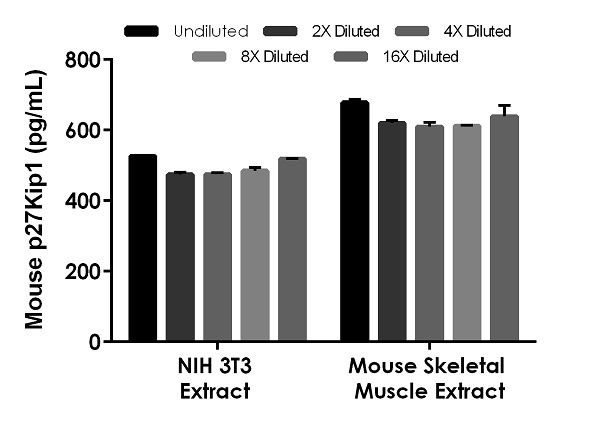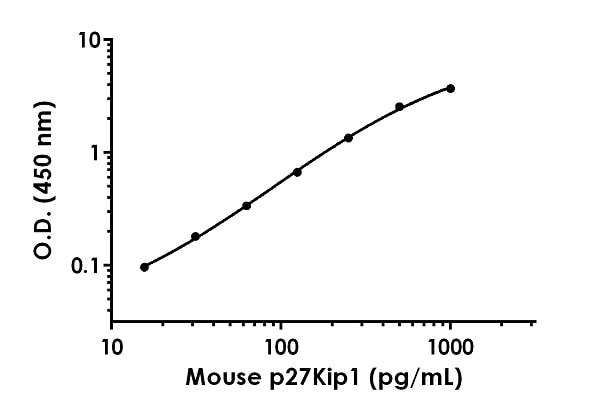Mouse p27Kip1 ELISA Kit (ab208982)
Key features and details
- One-wash 90 minute protocol
- Sensitivity: 7.5 pg/ml
- Range: 15.6 pg/ml - 1000 pg/ml
- Sample type: Cell culture extracts, Tissue Extracts
- Detection method: Colorimetric
- Assay type: Sandwich (quantitative)
- Reacts with: Mouse
Overview
-
Product name
Mouse p27Kip1 ELISA Kit
See all p27 KIP 1 kits -
Detection method
Colorimetric -
Precision
Intra-assay Sample n Mean SD CV% Overall 8 3.7% Inter-assay Sample n Mean SD CV% Overall 3 6.5% -
Sample type
Cell culture extracts, Tissue Extracts -
Assay type
Sandwich (quantitative) -
Sensitivity
7.5 pg/ml -
Range
15.6 pg/ml - 1000 pg/ml -
Recovery
Sample specific recovery Sample type Average % Range Cell culture extracts 96 94% - 101% -
Assay time
1h 30m -
Assay duration
One step assay -
Species reactivity
Reacts with: Mouse -
Product overview
Mouse p27Kip1 ELISA Kit (ab208982) is a single-wash 90 min sandwich ELISA designed for the quantitative measurement of p27Kip1 protein in cell culture extracts and tissue extracts. It uses our proprietary SimpleStep ELISA® technology. Quantitate Mouse p27Kip1 with 7.5 pg/ml sensitivity.
SimpleStep ELISA® technology employs capture antibodies conjugated to an affinity tag that is recognized by the monoclonal antibody used to coat our SimpleStep ELISA® plates. This approach to sandwich ELISA allows the formation of the antibody-analyte sandwich complex in a single step, significantly reducing assay time. See the SimpleStep ELISA® protocol summary in the image section for further details. Our SimpleStep ELISA® technology provides several benefits:
- Single-wash protocol reduces assay time to 90 minutes or less
- High sensitivity, specificity and reproducibility from superior antibodies
- Fully validated in biological samples
- 96-wells plate breakable into 12 x 8 wells stripsA 384-well SimpleStep ELISA® microplate (ab203359) is available to use as an alternative to the 96-well microplate provided with SimpleStep ELISA® kits.
-
Notes
Cyclin-dependent kinase inhibitor 1B (p27Kip1) is an enzyme inhibitor that is part of the Cip/Kip family of cyclin dependent kinase inhibitor proteins. p27Kip1 is a regulator of cell cycle progression involved at the G1 stage by binding to and preventing the activation of cyclin E-CDK2 or cyclin D-CDK4 complexes.
Abcam has not and does not intend to apply for the REACH Authorisation of customers’ uses of products that contain European Authorisation list (Annex XIV) substances.
It is the responsibility of our customers to check the necessity of application of REACH Authorisation, and any other relevant authorisations, for their intended uses. -
Platform
Microplate (12 x 8 well strips)
Properties
-
Storage instructions
Store at +4°C. Please refer to protocols. -
Components 1 x 96 tests 10X Mouse p27Kip1 Capture Antibody 1 x 600µl 10X Mouse p27Kip1 Detector Antibody 1 x 600µl 10X Wash Buffer PT (ab206977) 1 x 20ml 50X Cell Extraction Enhancer Solution (ab193971) 1 x 1ml 5X Cell Extraction Buffer PTR (ab193970) 1 x 10ml Antibody Diluent 4BR 1 x 6ml Mouse p27Kip1 Lyophilized Recombinant Protein 2 vials Plate Seals 1 unit Sample Diluent NS (ab193972) 1 x 12ml SimpleStep Pre-Coated 96-Well Microplate (ab206978) 1 unit Stop Solution 1 x 12ml TMB Development Solution 1 x 12ml -
Research areas
-
Function
Important regulator of cell cycle progression. Involved in G1 arrest. Potent inhibitor of cyclin E- and cyclin A-CDK2 complexes. Forms a complex with cyclin type D-CDK4 complexes and is involved in the assembly, stability, and modulation of CCND1-CDK4 complex activation. Acts either as an inhibitor or an activator of cyclin type D-CDK4 complexes depending on its phosphorylation state and/or stoichometry. -
Tissue specificity
Expressed in all tissues tested. Highest levels in skeletal muscle, lowest in liver and kidney. -
Involvement in disease
Defects in CDKN1B are the cause of multiple endocrine neoplasia type 4 (MEN4) [MIM:610755]. Multiple endocrine neoplasia (MEN) syndromes are inherited cancer syndromes of the thyroid. MEN4 is a MEN-like syndrome with a phenotypic overlap of both MEN1 and MEN2. -
Sequence similarities
Belongs to the CDI family. -
Domain
A peptide sequence containing only AA 28-79 retains substantial Kip1 cyclin A/CDK2 inhibitory activity. -
Post-translational
modificationsPhosphorylated; phosphorylation occurs on serine, threonine and tyrosine residues. Phosphorylation on Ser-10 is the major site of phosphorylation in resting cells, takes place at the G(0)-G(1) phase and leads to protein stability. Phosphorylation on other sites is greatly enhanced by mitogens, growth factors, cMYC and in certain cancer cell lines. The phosphorylated form found in the cytoplasm is inactivate. Phosphorylation on Thr-198 is required for interaction with 14-3-3 proteins. Phosphorylation on Thr-187, by CDK2 leads to protein ubiquitination and proteasomal degradation. Tyrosine phosphorylation promotes this process. Phosphorylation by PKB/AKT1 can be suppressed by LY294002, an inhibitor of the catalytic subunit of PI3K. Phosphorylation on Tyr-88 and Tyr-89 has no effect on binding CDK2, but is required for binding CDK4. Dephosphorylated on tyrosine residues by G-CSF.
Ubiquitinated; in the cytoplasm by the KPC complex (composed of RNF123/KPC1 and UBAC1/KPC2) and, in the nucleus, by SCF(SKP2). The latter requires prior phosphorylation on Thr-187. Ubiquitinated; by a TRIM21-containing SCF(SKP2)-like complex; leads to its degradation.
Subject to degradation in the lysosome. Interaction with SNX6 promotes lysosomal degradation. -
Cellular localization
Nucleus. Cytoplasm. Endosome. Nuclear and cytoplasmic in quiescent cells. AKT-or RSK-mediated phosphorylation on Thr-198, binds 14-3-3, translocates to the cytoplasm and promotes cell cycle progression. Mitogen-activated UHMK1 phosphorylation on Ser-10 also results in translocation to the cytoplasm and cell cycle progression. Phosphorylation on Ser-10 facilitates nuclear export. Translocates to the nucleus on phosphorylation of Tyr-88 and Tyr-89. Colocalizes at the endosome with SNX6 and this leads to lysosomal degradation. - Information by UniProt
-
Alternative names
- AA408329
- AI843786
- Cdki1b
see all -
Database links
- Entrez Gene: 12576 Mouse
- SwissProt: P46414 Mouse
- Unigene: 2958 Mouse
Images
-
SimpleStep ELISA technology allows the formation of the antibody-antigen complex in one single step, reducing assay time to 90 minutes. Add samples or standards and antibody mix to wells all at once, incubate, wash, and add your final substrate. See protocol for a detailed step-by-step guide.
-
Background-subtracted data values (mean +/- SD) are graphed.
-
 Interpolated concentrations of native p27Kip1 in mouse 3T3 extract and skeletal muscle extract based on a 1,000 µg/mL extract load.
Interpolated concentrations of native p27Kip1 in mouse 3T3 extract and skeletal muscle extract based on a 1,000 µg/mL extract load.The concentrations of p27Kip1 were measured in duplicate and interpolated from the p27Kip1 standard curve and corrected for sample dilution. The interpolated dilution factor corrected values are plotted (mean +/- SD, n=2). The mean p27Kip1 concentration was determined to be 496 pg/mL in NIH3T3 extract and 634 pg/mL in mouse skeletal muscle extract.
-
The concentrations of p27Kip1 in rat brain extract were measured in duplicate, interpolated from the mouse p27Kip1 standard curves and corrected for sample dilution. Undiluted samples are rat brain extract 62.5 μg/mL. The interpolated dilution factor corrected values are plotted (mean +/- SD, n=2). The mean p27Kip1 concentration was determined to be 1,077 pg/mL in rat brain extract.
-
To learn more about the advantages of recombinant antibodies see here.










